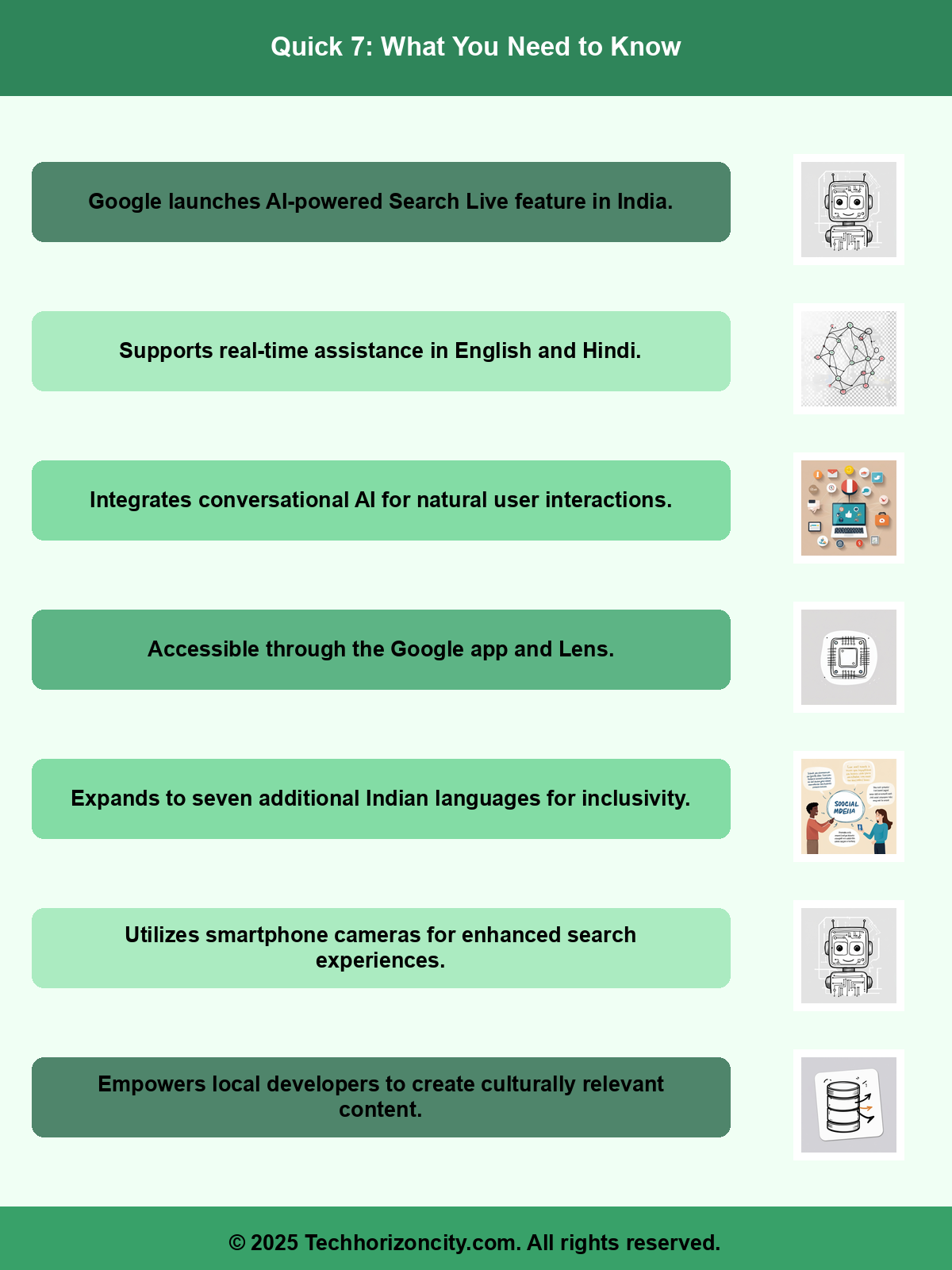Executive Summary
In a significant stride towards enhancing the digital landscape, Google has rolled out its innovative AI-driven conversational search feature, Search Live, in India. This launch, which follows the feature’s debut in the United States, marks a critical milestone for users, offering real-time assistance and support in both English and Hindi. With Search Live, Google is not only leveraging India’s early enthusiasm for AI technology but also expanding its capabilities to cater to a diverse linguistic audience. This article delves into the context, implications, and future of conversational AI in search technology, highlighting the transformative potential of Search Live in a rapidly evolving digital ecosystem.

Background Context
The emergence of conversational AI technologies has reshaped how users interact with search engines. Google’s commitment to innovation is underscored by its Project Astra, a foundational technology behind Search Live, which was first introduced in the U.S. in July 2023. The incorporation of AI capabilities allows users to engage with their search queries in a more natural, conversational manner. With a user-friendly interface accessible through the Live icon in the Google app or via Lens, the feature integrates seamlessly into the daily routines of millions. Moreover, the decision to support both English and Hindi in India reflects an understanding of the local market’s linguistic diversity, paving the way for further expansions into regional languages.
For technical resources and innovative solutions, please visit EchoesOfCreationUS for specialized technical resources.
Analysis of Implications
The launch of Search Live in India is not merely a technological advancement; it represents a strategic positioning for Google in a competitive market. As the second country to receive this feature, India stands at the forefront of Google’s AI initiatives. The engagement with early adopters of AI technology in India is crucial for fine-tuning and enhancing the feature’s capabilities. The use of users’ smartphone cameras for real-time assistance not only broadens the scope of search queries but also introduces a tactile element to search experiences, allowing users to receive information based on visual inputs.
Furthermore, the expansion of Google’s AI mode to encompass seven additional Indian languages—including Bengali, Kannada, Malayalam, Marathi, Tamil, Telugu, and Urdu—exemplifies a commitment to inclusivity. By fostering a multi-lingual AI environment, Google can cater to more users, enhancing accessibility and engagement. This approach also empowers local developers and content creators, encouraging them to produce tailored content that resonates with the cultural nuances of various linguistic groups.
Discover exclusive offers and premium content at Active Living Offers – your gateway to enhanced productivity and lifestyle solutions.
Industry Impact Assessment
The introduction of Search Live is poised to significantly disrupt the search engine landscape. By leveraging AI, Google is setting a new standard for user interaction with search technology, compelling competitors to innovate or risk obsolescence. Companies like Microsoft, with its integration of AI in products like Bing and Copilot, will need to respond to this shift with rapid advancements of their own. Additionally, the expansion of AI capabilities in search raises important questions about data privacy and ethical usage, as users may be less aware of how their visual and contextual information is processed and utilized.
Moreover, this development catalyzes a broader acceptance and integration of AI in everyday life, as users become more accustomed to interacting with machines in a conversational manner. The implications for industries beyond search—such as e-commerce, customer service, and education—are profound, creating opportunities for innovative applications that harness conversational AI technology.
Future Outlook
Looking ahead, the trajectory of AI-powered search features like Search Live indicates a promising fusion of technology and user-centric design. As Google plans to expand its AI Mode to include over 35 languages and reach 40 new countries and territories, the global search landscape will become more interconnected, with localized search experiences that cater to diverse populations.
In India, the adaptation of Search Live will likely see iterative improvements driven by user feedback and engagement metrics. This could lead to increasingly personalized experiences, where AI learns from individual preferences and behaviors to deliver tailored content. As the technology matures, we may witness advancements in contextual understanding, enabling users to receive more relevant results based on their current environments and needs.
Conclusion with Key Takeaways
The launch of Google’s Search Live in India represents a transformative moment in the realm of conversational AI and search technology. By embracing a multi-lingual approach and harnessing the power of real-time assistance, Google is not only revolutionizing the way users search but is also setting a precedent for future innovations.
Key takeaways from this development include:
- The significance of leveraging local languages in technology to enhance accessibility.
- The role of user engagement in refining AI capabilities and driving innovation.
- The potential for widespread implications across various sectors, prompting shifts in user behavior and expectations.
- The necessity for ethical considerations in the deployment of AI technologies, especially regarding data privacy.
As we move forward, the evolution of search technology through AI will continue to captivate users and reshape industries, heralding a new era of digital interaction.
Disclaimer: This article was independently created based on publicly available information and industry analysis.
